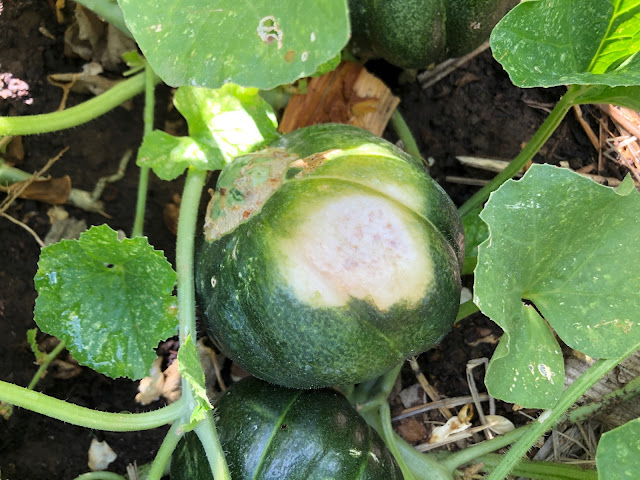
Don't let your garden fry this week

|
| Melons get sunburned, too. See the hacks post linked below to protect them. (Photo: Kathy Morrison) |
Argh, here comes another heat wave. A heat advisory has been issued for Thursday through Saturday in the Sacramento area.
We gardeners can hide inside. Our plants aren't so lucky.
Fortunately, we here at Sacramento Digs Gardening have a lot of experience with gardens and heat. Here are links to several past columns, with advice to use now, before the temps climb Wednesday:
-- Get Ready for Hot Days Ahead
-- Mulch is Good, and More Mulch is Better
-- 5 Hacks for Shading Your Precious Vegetables
-- Hot Tomato! How to Help Your Vines During High Heat
-- Speaking for the Trees: Don't Forget Them in This Heat
- - For Best Roses in Heat, Watch Water and Mites
And if you're too late:
-- Rescuing a Heat-Stressed Plant
Finally, for the gardener:
Comments
0 comments have been posted.Sacramento Digs Gardening to your inbox.
Sites We Like
Garden Checklist for week of April 14
It's still not warm enough to transplant tomatoes directly in the ground, but we’re getting there.
* April is the last chance to plant citrus trees such as dwarf orange, lemon and kumquat. These trees also look good in landscaping and provide fresh fruit in winter.
* Smell orange blossoms? Feed citrus trees with a low dose of balanced fertilizer (such as 10-10-10) during bloom to help set fruit. Keep an eye out for ants.
* Apply slow-release fertilizer to the lawn.
* Thoroughly clean debris from the bottom of outdoor ponds or fountains.
* Spring brings a flush of rapid growth, and that means your garden needs nutrients. Fertilize shrubs and trees with a slow-release fertilizer. Or mulch with a 1-inch layer of compost.
* Azaleas and camellias looking a little yellow? If leaves are turning yellow between the veins, give them a boost with chelated iron.
* Trim dead flowers but not leaves from spring-flowering bulbs such as daffodils and tulips. Those leaves gather energy to create next year's flowers. Also, give the bulbs a fertilizer boost after bloom.
* Pinch chrysanthemums back to 12 inches for fall flowers. Cut old stems to the ground.
* Mulch around plants to conserve moisture and control weeds.
* From seed, plant beans, beets, cantaloupes, carrots, corn, cucumbers, melons, radishes and squash.
* Plant onion sets.
* In the flower garden, plant seeds for asters, cosmos, celosia, marigolds, salvia, sunflowers and zinnias.
* Transplant petunias, zinnias, geraniums and other summer bloomers.
* Plant perennials and dahlia tubers for summer bloom.
* Mid to late April is about the last chance to plant summer bulbs, such as gladiolus and tuberous begonias.
* Transplant lettuce seedlings. Choose varieties that mature quickly such as loose leaf.